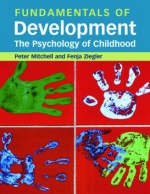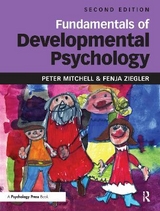
Fundamentals of Development
Psychology Press Ltd (Verlag)
978-0-86377-793-6 (ISBN)
- Titel erscheint in neuer Auflage
- Artikel merken
Fundamentals of Development: The Psychology of Childhood outlines the main areas of developmental psychology, following a thematic approach and offering a broad overview of contemporary interest in the subject. Straightforward language and ample illustrations introduce the reader to the key areas in child development. The material is carefully organized to be as student-friendly as possible. Each chapter addresses a topic, such as perception, verbal communication, and theory of mind. Therefore, chapters are self-contained and comprehensive in their coverage of each aspect of development.
This replacement for the highly successful Psychology of Childhood has been thoroughly revised with additional material based on articles appearing in the best academic journals, and covers the major studies which have stood the test of time. The book makes an excellent companion for courses introducing developmental psychology, and serves as an accessible yet comprehensive introduction for students and professionals who may have no background knowledge of the subject.
This textbook is accompanied by a CD-ROM of instructor resources which is free of charge to university departments that adopt this book as their text. It includes chapter-by-chapter lecture slides, an interactive chapter-by-chapter multiple-choice question test bank, and multiple-choice questions in paper and pen format.
Peter Mitchell is Professor in Cognitive Development in the School of Psychology at the University of Nottingham, UK. His main research interests are the development of an understanding of the mind in typical and atypical development, and visuo-spatial abilities in autism. He is Chair of the Developmental Section of the British Psychological Society (2004-2006) and in 2007 will become editor of the British Journal of Psychology. Fenja Ziegler is a post-doctoral Research Fellow in Psychology at the University of Nottingham, UK. Her main research interests are the development of perspective-taking skills in typical and atypical populations, and the processes underlying people’s ability to take perspectives.
Chapter 1. Themes and Perspectives in Developmental Psychology. Behaviorism. Nativism. Maturation and Ethology. Stage Theories: Freud and Piaget. Developmental Psychology. Summary. Chapter 2. The Development of Thinking. Stages of Cognitive Development. Piaget’s Explanation of Cognitive Development. Traditional Learning Theory as a Contrasting Explanation of Development. A Supplement to Piaget’s Theory: Self-centered Adolescents. Summary. Further Reading. Chapter 3. Do Piaget’s Theory and Findings Stand Up to Examination? Infant Competence. Competence in Early Childhood. Concrete Thought in Adolescence. The Impact of Post-Piagetian Research. Constructivism and Social Constructivism. Summary. Further Reading. Chapter 4. What Children Understand about the Mind. Have Children Been Underestimated? Is Development Stage-like? What Causes Development? Competence in Deception. Summary. Further Reading. Chapter 5. Autism. What is Autism? The Theory of Mind Hypothesis. Can Some Children with Autism Acknowledge False Belief? Inflexibility in Thought. Weak Central Coherence. Summary. Further Reading. Chapter 6. Developing an Ability to See the World. Perception of the World as 3-D. Perception of Social Stimuli. The Role of Experience and Learning in Perceptual Development. Summary. Chapter 7. Developing an Ability to Draw. Intellectual Realism. Is Intellectual Realism Confined to Early Childhood? Size of Drawing as an Indication of Significance of the Topic. Children’s Drawings in Cases of Incest. Summary. Further Reading. Chapter 8. The Role of Heredity and Environment in Intelligence. What is Inherited? Intelligence: Heredity versus Environment. Describing and Testing the Concept of Intelligence. Problems with Testing Intelligence. Heritability of Intelligence. Evaluating the Twin Studies. Environmental Factors and IQ. The Social Environment. IQ, Elitism, and Racism. Summary. Further Reading. Chapter 9. Language Development. The Components of Language. A Description of Language Development. Vocabulary Development. Theories of Language Acquisition. Chomsky’s Theory of Innate Language Development. A Second Look at the Environment. Summary. Further Reading. Chapter 10. Developing an Ability to Communicate. Egocentric Speech. Young Children’s Sensitivity to Their Listener. Strengths and Weaknesses in Young Children’s Communication. Do Young Children Treat Utterances as Clues to Meaning? Children Overestimate Their Ability to Interpret Correctly. Are Young Children Too Literal? Evaluating Utterances and Detecting Ambiguity. Is Egocentrism Responsible for Children’s Communicative Difficulties? Summary. Chapter 11. Parenting and the Development of Love and Attachment. Parenting. Love. Attachment. Types of Attachment. The Sociobiology of Attachment. Single versus Multiple Attachments. Delinquency. Internal Working Model. Summary. Further Reading. Chapter 12. Freud’s Theory of Personality Development. Freud on Personality and Hysteria. The Tools of Psychoanalysis. The Components of Personality. Stages of Development. Is Freud’s Theory Useful? Summary. Chapter 13. Moral Development. Piaget’s Moral Realist and Moral Subjectivist. Evaluation of Piaget’s Theory. Kohlberg’s Stages of Moral Reasoning. Evaluation of Kohlberg’s Stage Theory. Prosocial Behavior. Moral Emotions. Summary. Further Reading. Chapter 14. Development of Antisocial Behavior. What is Aggression? Are Children Born Good or Bad? Catharsis, or Learning to be Violent. Aggressive Behavior Can Be Learned. Does Watching Violent TV Make Children Violent? Naturalistic and Controlled Studies of the Link between TV and Aggression. Exposure to Violent TV Promotes Aggression. Other Influences on Aggression. Frustration as a Cause for Aggression. Attention Seeking and Rejection. Gender, Class, and Violence. Exposure to Media Violence and Aggression. Summary. Further Reading. References. Glossary. Author Index. Subject Index.
| Erscheint lt. Verlag | 26.4.2007 |
|---|---|
| Verlagsort | Hove |
| Sprache | englisch |
| Maße | 189 x 246 mm |
| Gewicht | 839 g |
| Themenwelt | Geisteswissenschaften ► Psychologie ► Entwicklungspsychologie |
| ISBN-10 | 0-86377-793-7 / 0863777937 |
| ISBN-13 | 978-0-86377-793-6 / 9780863777936 |
| Zustand | Neuware |
| Informationen gemäß Produktsicherheitsverordnung (GPSR) | |
| Haben Sie eine Frage zum Produkt? |
aus dem Bereich



